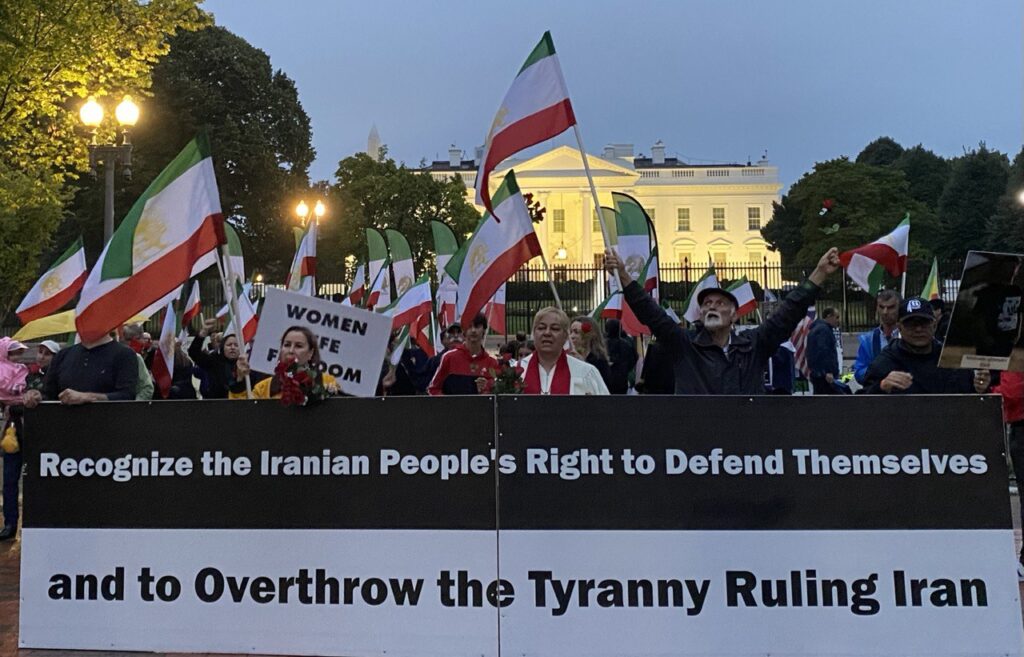The question of “how to deal with Iran” has been among the top foreign policy challenges for Washington for the past four decades. But with policies focused on Tehran’s nuclear threat and reckless attempts to empower imaginary Iranian “moderates,” Washington has failed to recognize – and strategize for – a revolution that has been long in the works.
Four generations of Iranians have withstood the imposition of an Islamic fundamentalist rule. It has brought them the misery of Iran-Iraq war with a half-million killed; the horrific political killings of the 1980s, including the 1988 massacre of 30,000 political prisoners and the 2019 killing of over 1,500 peaceful protesters; the repression of ethnic and religious populations; poverty and a foundationally broken economy; and a kleptocracy that funds regional terror groups and institutionalizes violence against women, children and ethnic and religious minorities.
Washington is fully aware of these crimes against humanity. Surely the administration has also known of the growing anger and impatience among the Iranian people.
In recent weeks, Iranians have shown the world how they are determined to change the regime despite a ruthless crackdown underway that mostly and savagely targets women and youth. The new wave of anti-regime protests, sparked over the brutal killing of Mahsa Amini, have now reached over 170 cities across Iran. More than 400 protesters have been killed and nearly 20,000 arrested.
Killings of the young girls like Nika Shahkarami, Sarina Esmaeilzadeh and many more have become global news headlines. This cycle of protests represents the latest iteration of the Iranians’ revolution in the making, possibly its last, if Washington doesn’t take steps to nurture it.
A popular message coming from Iranians is that this is “not a protest; this is a revolution.”
Despite the growing bipartisan impatience in the U.S. Congress to do more, the Biden administration has refrained from publicly supporting the ultimate objective of these protests – the ouster of the clerical regime – and has sufficed with lukewarm comments, such as from Jake Sullivan, the national security advisor, who said of the protests, “[we are] watching what is happening in Iran.” And Robert Malley, U.S. Special Envoy for Iran, has stated that U.S. policy is “not a policy of regime change.”
These outdated policy postures and watchful eyes of the administration will not suffice during this heroic uprising in the name of freedom. The ask here is not boots on the ground, but it is public support.
Some American leaders know what this looks like. In 2009, President Obama delivered a powerful Nobel Peace Prize acceptance speech, outlining the concept of “just cause war” suggesting that “it is waged as a last resort or in self-defense.” The people of Iran and their resistance movement have been fighting a “just cause war” with a brutal regime for decades and earned the right to self-defense based on international laws.
Iran has a resilient and well-organized resistance movement, led by women, that has persisted and grown over the years. Women are now front and center in the last several weeks and they are the agent of change in Iran.
The United States must support Iranians’ right to self-defense. Moreover, the administration must actively engage the authentic leadership of the movement, along with its vision, organizational capability, accomplishments to date, and plan of action for the transitional government and future of Iran.
Such an approach will not only align with America’s policy pledging support for human rights and democracy, but it is also in Iran’s interest. As Dan Shapiro, the former U.S. ambassador to Israel, says, “for the Iranian people to have freedom, there is no way around regime change,” arguing that United States can do more.
In addition to recognizing the Iranians’ rights to self-defense and their right to oust the clerical regime, the Biden administration should:
- Immediately end nuclear negotiations with Iran;
- Significantly expand and enforce existing U.S. sanctions, especially in light of recent attacks on the Evin prison as a state-run plot to massacre political prisoners.
- Impose travel bans on regime officials and their families and freeze their assets in the U.S.;
- Promote a global campaign to close Iranian embassies and urge allies to recall their ambassadors;
- Publicly press for the release of all political prisoners and endorse the calls to dismantle the Islamic Revolutionary Guards, the force primarily responsible for the killing of protesting Iranians at home and abroad.
What is happening in Iran is a nationwide movement for regime change, engineered and achieved by Iranians. Time is of the essence for this coming revolution and U.S. policy must support this bid for freedom.







